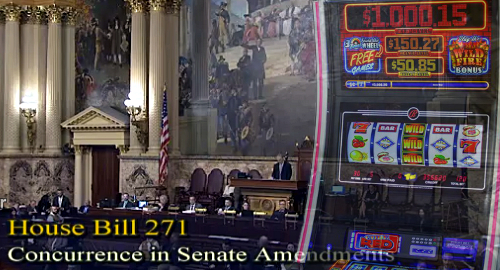 Pennsylvania’s gambling expansion push geared up for a legislative showdown on Wednesday after the state House of Representatives sent its own plan to the Senate for further revision.
Pennsylvania’s gambling expansion push geared up for a legislative showdown on Wednesday after the state House of Representatives sent its own plan to the Senate for further revision.
On Wednesday, the House Rules Committee approved an amended version of HB 271, which the state Senate approved last week. The House version differs markedly from the Senate bill, including the contentious issue of video gaming terminals (VGT) in thousands of bars and clubs.
When the House started debate on the bill at 5pm local time, many members complained that the House computer system had only just made the bill available, and given that it’s a 675-page monstrosity – although the first 200 pages are strike-throughs – they wanted more time to read the thing.
Those who did read the bill came equipped with the day’s most popular epithet, calling HB 271 the “slots and shots” bill, referencing the proposal to allow VGTs in venues that hold state liquor licenses. If any pols had taken a shot every time that phrase was uttered, they’d have been soused enough to have voted for VGTs in daycares without giving a damn about the consequences.
When the vote was finally tallied, HB 271 was approved by a margin of 102-89.
SO WHAT’S IN IT?
The amended House bill would allow the state’s 12 casino operators to launch online gambling operations, albeit under more favorable terms than the Senate envisioned. The Senate plan would tax online slots revenue at 54% and online poker at 16%, while charging licensees upfront fees of $5m for each online gambling vertical they choose to offer.
The House would tax all online revenue at 16%, plus an additional 3% in local share assessment. Casinos would pay $8m for online licenses, while the casinos’ technology vendors would face $2m fees. The House doesn’t intend to limit online licensees to two branded ‘skins” like the Senate plan. And unlike recent bills in New York and Illinois, there is no specific ‘bad actor’ clause regarding vendor suitability.
The House bill also authorizes daily fantasy sports, with licensed operators facing 19% tax on their revenue. Five-year licenses would cost $50k with annual renewals pegged at $5k or 7.5% of annual revenue, whichever is less. There’s also plans to allow ‘fantasy contest terminals,’ the concept of which isn’t exactly clear.
As with the Senate plan, the House would allow the state lottery to offer online draw ticket sales and instant games, provided those games don’t resemble slots or casino table games.
The bill includes Pennsylvania’s now standard provision for interactive gaming at state airports, but who cares, since it’s doubtful that any operator will be willing to pay up to $5m to cater only to individuals who are waiting to board planes. There’s also a plan to permit sports betting, but only if the federal government lifts its betting prohibition.
As for those VGTs, the House is on board with plans to allow 40k of the things in bars, VFW halls, truck stops and the like. The concept, which is vehemently opposed by the state’s casino operators and has few fans in the Senate, was enough to derail 2016’s gambling expansion plans and may yet prove fatal to this year’s effort.
The potential for offering VGTs in some nursing homes was purged from the House bill, but this ended up providing the day’s most memorable moment, in which Rep. Mark Mustio nearly prompted a fist-fight with a fellow representative over their mutual appearance in an anti-VGT campaign video.
Once order was restored, Mustio noted that while the nursing home VGT language had been removed, he planned to ask legislators to re-insert the language when he reached retirement age so that he could ensure that whatever nursing home he ended up at had VGTs as an entertainment option.
Other changes include a proposal to add slots at off-track betting parlors, resolving the unconstitutionality of casinos’ local share fees and permitting skill-based slots.
WHAT NOW
The Pennsylvania legislature has until June 30 to deliver a budget, to which expanded gambling options (of whatever form) are expected to contribute at least $150m. The Senate will now be asked to reconcile the House’s vision of gambling expansion with what the Senate wants to see happen.
Bottom line: there’s an awful lot of sausage to be made over the next couple weeks, and none of it will be pretty to watch.